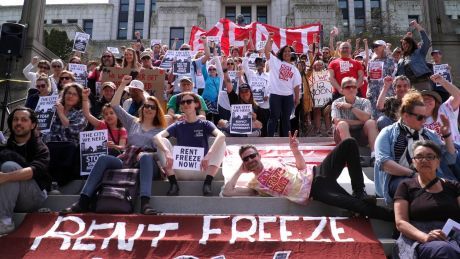News
You are here
Radical electoralism: COPE victory in Vancouver

October 29, 2018
There is lots of good news from the Vancouver city election on October 20. First and foremost is that one of the three COPE candidates for council, Jean Swanson, won a seat, with the fourth most votes. COPE ran an incredibly inspiring campaign that stressed unapologetically working-class demands. They emphasized that the life of renters and the rest of the working class can only improve if we take power and money away from the 1%. The campaign focused on fighting for a rent freeze, ending homelessness in one year and imposing a mansion tax on homes worth more than $5 million.
This campaign won a partial victory weeks before the vote. The provincial NDP government announced that the allowable rent increase would be 4.5%, in a city where the average rent for a one bedroom apartment is now above $2000, this would have meant increases of over $1000 for many renters. COPE and the Vancouver Tenants union organized rallies, and email campaigns to MLA’s and the province reduced the increase to 2.5%. As the candidates said repeatedly, “Two down and 2.5% to go!”
The COPE concentrated on those most effected by the housing crisis and canvassed hundreds of apartment buildings in the lead up to the vote. Mainstream parties usually put little effort into renters since they tend to vote much less than people in condos or houses.
The makeup of the new council is also good news. For a decade the mayor and the majority on council have been members of Vision Vancouver. This is Vancouver’s version of the federal Liberal strategy: get all your funding from business, look out for their needs first and then try to convince the rest of us that we matter. As a result, property developers and speculators have done very well for themselves, rental vacancy rates have plunged to zero, the numbers of homeless people have remained constant, and rents have shot through the roof.
The other traditional pro-business party is the NPA, between them the two business parties had the mayor and nine of the ten council positions before the election. The new council, along with Jean, includes Kennedy Stuart, a former NDP MP as mayor, three greens, Christine Boyle from One City and five NPA councilors. In more great news, Vision Vancouver was unable to get a single seat on council, and their best placed candidate, Tanya Paz, was nine people back of the last councilor to get in. Paz won 29,000 votes compared to Swanson’s 49,000.
On election night Derrick O’Keefe, who almost made it onto council explained the importance of this, “For years they told us you have to vote for the centre, voting for the left spoils elections, well tonight we saw the opposite, COPE is back and Vision is gone.” The COPE campaign and electoral success shows that the radical left can get a hearing and win elections.
It also shows that elections can be won without mainstream parties’ fixation with data mining and elaborate social media campaigns. Working class people with with working class politics can talk and convince other workers of the need to vote in their own interests.
The good news from this election continues, none of the three new pro-business parties, Coalition Vancouver, Vancouver 1st and YES Vancouver got a single candidate elected to council, school board or parks board.
Two of the three Green councilors did significantly better than the rest of the winners. Adrienne Carr and Peter Fry won nearly 70,000 and 62,000 votes respectively, while the rest of the elected councilors won between 43,000 and 53,000. If everyone who cast a vote voted for at least one councilor, Carr received 39.5 per cent of the vote. Since none of the major parties fielded a complete slate, it’s very likely that this reflects their own support but also voters from the right and the left choosing the Greens as a second choice.
Now that the election is over COPE is gearing up to win the fight for a rent freeze and a mansion tax to end homelessness. As Jean Swanson said at the election night victory party, before the results were announced, “our accomplishment and our focus is movement building." Watch out for actions on the day the council members are sworn in and on the first day that council meets.
Section:
Topics:









